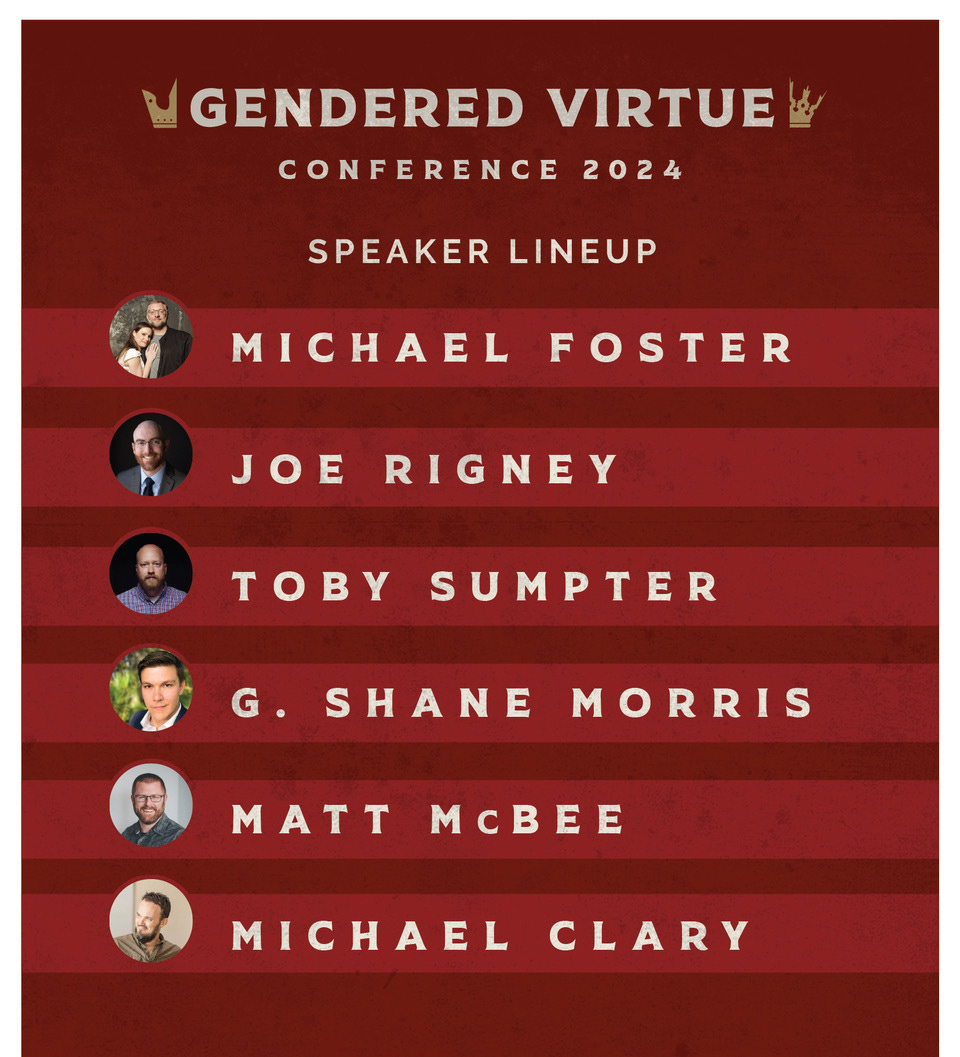How Men and Women Express Virtue Differently
Christians need to resist the pressure to androgenize our faith
(For more context on this article, see my post from last week about the need for gendered virtue.)
For this post, my basic thesis is this: virtuous manhood and womanhood is oriented towards fatherhood and motherhood. To unpack this thesis, let’s begin with love. Love is the highest virtue (1 Cor 13:13). It is the animating principle of all Christian obedience. It is the sum of the law and the greatest commandment (Matt 22:37-39) and the initial fruit of the Spirit (Gal 5:22). Love is the word that describes God’s very being (1 John 4:7-8).
It goes beyond sentimental well wishing. It’s not merely a private feeling, but a public good, given for the benefit of others. Naturally, men and women express and receive love differently. A virtuous man loves like a father, and a virtuous woman loves like a mother.
As important as love is, it is often ill-defined. Defined biblically, love is the sacrificial commitment to the highest good of another. Love is centered on God, most of all, then on others (Matt 22:37-40). Therefore, with love as the foundation of all Christian virtue, one should be asking, “who is this virtue for?” Applied to the sexes, we should ask, who benefits from a man’s strength? Who will receive a woman’s generosity? Who is protected by a man’s courage? Who benefits from a woman’s kindness? Who is helped by a man’s mercy? Who is healed by a woman’s nurturing care?
Love is the sacrificial commitment to the highest good of another.
Christian virtue, shaped by Christian love, is ultimately directed outward, towards those in the one’s community. Therefore, men and women are naturally equipped to love others in unique ways, with different strengths and priorities. That’s a good thing. God designed it that way. We are not merely different from each other but for each other. Our differences, animated by Christian love, complement and complete what is lacking in others.
For example, my wife’s natural inclination towards compassion draws a measure of compassion out of me, while also summoning my strength and decisiveness to take action to meet needs I might not otherwise have met on my own. A well-ordered household benefits from this dynamic. Masculine weaknesses are compensated by feminine strengths, and feminine weaknesses are compensated by masculine strengths. Such is God’s design. My masculine strength and directness meet certain needs in our household, which in turn frees my wife to use her tenderness, warmth, and nurture to meet different needs of the household. Virtue is shaped by the love and service we render to the people God has bound us to.
Gendered virtue is most glorious when it is expressed for the benefit of others, as God designed it in the garden. Adam’s task of subduing the earth required his masculine strength to lead, provide, and protect his wife. Eve’s task of helping her husband and filling the earth required her tenderness and nurturing help. God designed them both to give and receive according to their distinct bodies and natures.
Men and women are at their best when their respective strengths are valued by one another, and who serve one another in love (Gal 5:13). In the Garden, before Eve was created, the only thing that was not good was the lack of a woman’s potentiality. Creation was incomplete until it received a woman’s strength. If creation simply needed more masculine strength, God could have created another man. But that’s not what it needed. It needed another being of the same kind but with different potential. Motherhood is the strength of womanhood. It is the potentiality that most uniquely defines her.
Virtue corresponds to design. As J. Budziszewski put it, “Sanity begins with the fact that men are potentially fathers, and women potentially mothers. This is not just a fact about what kind of thing they might or might not do some day, but about what kind of being they are inwardly aimed at becoming.” He’s right about that. Nature points to something beyond itself.
Sexuality has a goal—a purpose, or a telos—which, ultimately, is to reproduce. This is why sexual distinctions are more important than other human distinctions. They were made to accomplish a goal. God does not assign different vocations to tall people or short people, or to people with blue eyes or brown eyes. Those are merely manifestations of God’s creativity. But God does assign vocations according to our sex. Masculinity was created for fatherhood, and femininity was created for motherhood. The vocations of father and mother do not represent the full range of virtue for men and women, but they do supply the basic contours of each, since they represent the telos of sexuality at its fullest expression.
Sexual distinctions are more important than other human distinctions. They were made to accomplish a goal. Masculinity was created for fatherhood, and femininity was created for motherhood.
As a model for gendered virtue, I am speaking of fatherhood and motherhood as relational paradigms. A virtuous man is like a godly father, the sort of man that takes sacrificial responsibility for others to lead, provide, and protect them. A virtuous woman is like a godly mother, the sort of woman that gives life by nurturing, helping, supporting, and influencing others.
These relational patterns can be learned and put into practice, which is so desperately needed in our fast androgenizing world.
King’s Domain Conference: Gendered Virtue
King’s Domain ministries in Cincinnati is hosting a conference this April 18-20 to promote Christian virtue for men and women. I’d love to personally invite readers of the Current Reality newsletter to come and join us!
The theme is “Gendered Virtue: Men and Women Who Take Dominion.” Here’s a quick explainer for why we’re doing it and why you should come.
Why do we need this conference?
The future belongs to those with healthy, Christian households. Unfortunately, these are becoming an endangered species. Many Christians lack a basic understanding of sexuality and what it's for. This conference will provide solid guidance that will benefit every household at any stage.
What will you gain from this conference?
Everyone who attends this conference will take away these three things (other than the sweet Tshirt, free book, and other SWAG):
A biblical blueprint for establishing Christian households that lasts for generations
Practical application for men and women from experienced gospel ministers
Tangible steps you can take to move forward in your specific situation
Who is this conference for?
This conference is for men and women, single or married, whether or not you have children.
What's the cost?
Only $119. (I said it wrong in the video! $119 is the correct price). That's a great price, especially considering the quality of content you'll get.
Who's speaking?
Check out this lineup! Michael Foster, Joe Rigney, Toby Sumpter, Shane Morris, Matt McBee, and Michael Clary.
Stay tuned to the Plain Speech Podcast (YouTube, Spotify, Apple, others) for interviews of the conference speakers in the coming weeks.
Here’s a clip from my interview with Dr. Joe Rigney that drops this Monday.
Here’s the first interview (Spotify, Apple) with pastor Toby Sumpter. It’s fantastic!
Where do I register and find out more info?
Simple. Just go to www.genderedvirtue.com
Media Appearances
I’ve got a few interviews here that I’ve done in the last couple of months about a wide array of topics, such as urban church planting, liberalizing institutions, and singleness.
Interview about how a rural guy from West Virginia planted an Urban Church in Cincinnati
From Richard Henry’s Contra Talk podcast
Interview about Institutions and Churches going Liberal
From Steve Hartland’s Grounded podcast
Interview about the Modern Explosion of Singleness in the Church
From the Forge and Anvil podcast
Interview about God’s Good Design for Sexuality
From the “Got a Minute?” podcast with Larson Hicks and Rich Lusk






